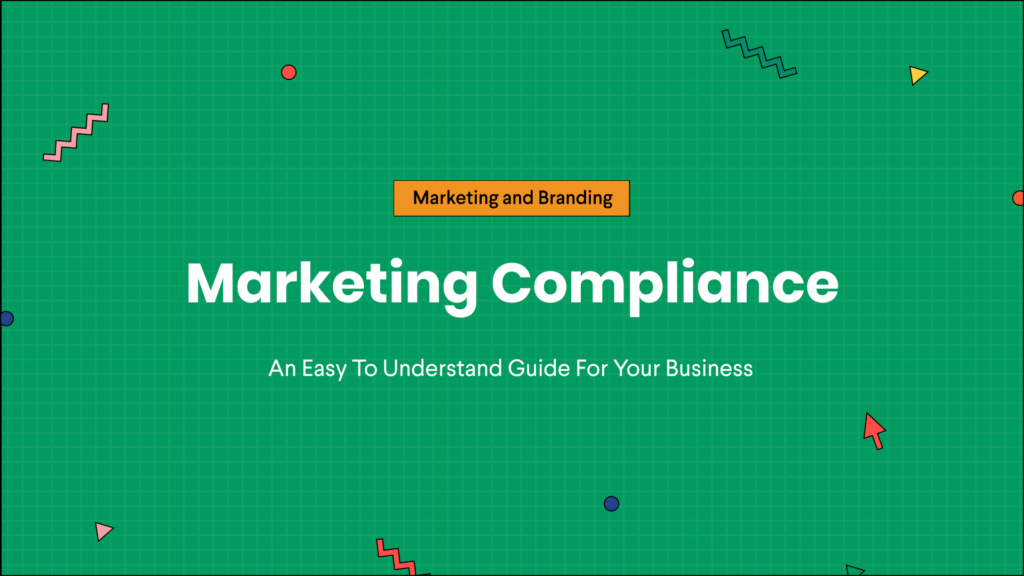When you first think about it, marketing compliance can look intimidating. But believe us, it’s not as difficult as you might be making it out to be in your head. It’s straightforward to understand.
You may be used to thinking about what’s best for your business. It’s time to take other stakeholders into account – including your employees and your customers.
Compliance in marketing is for the customers: to protect their rights and safeguard their privacy.
Essentially, it means implementing the rules and regulations set by the government. But for creative professionals, it can also mean designing a strategy to protect brand integrity and consumer trust.
Table of Contents
What Is Compliance Regulations in Marketing?
Marketing compliance consists of laws that protect consumers from being deluded or deceived by organizations. Administrative units also usually protect consumer protection rights and check how organizations gather, store, or use customer information.
But for creative content creators, marketing compliance can mean more than just following rules and guidelines. An all-around characterized marketing compliance methodology can include ensuring brand loyalty and consumer trust.
For this, you must maintain oversight of activities, decisions, and changes through the entire content creation process.
Why Is Marketing Compliance Often Disregarded?
Some businesses can sometimes be under the impression that marketing compliance is merely a formality and doesn’t need to be taken seriously.
The truth is, some may even consider it to be an annoyance that’s better disregarded.
But you must realize that compliance isn’t only for exceptionally controlled enterprises like medical care or financial administrations. It’s crucial for all types of businesses. And if you dismiss it now, it could cost you a lot in the future.
If your business ends up overlooking marketing compliance guidelines, you’ll have to face repercussions. Apart from the fines you’ll likely have to pay, you could also lose clients, and this will undeniably take a hit on your reputation and brand image.
Why Is Compliance in Marketing Important?
The impression that you make on potential customers can dramatically impact the number of sales you make. These days, social media has enabled customers to see everything. And this means that you can’t hide any unethical behavior.
Moreover, brand integrity holds more significance today than ever before. Most customers expect brands to be utterly authentic on social media and uphold them to high standards.
So, when you make a wrong impression on potential customers, it can quickly ruin your relationship with them and tarnish your brand image in the process.
It’s just not worth it.
Besides, official laws forbid businesses from certain types of methods (of sale or production) or other deceitful acts. And if federal or State regulators find out that your brand isn’t abiding by those rules, they can open an investigation, file a lawsuit against you, or even monetarily fine your company.
Compliance guidelines ensure that such a situation doesn’t arise.
Why Is Marketing Compliance Difficult?
When it comes to marketing, it’s easy to disregard things without realizing the consequences. You may believe that as long as you have your marketing, sales, or compliance team check their work to ensure it meets all legal and brand requirements, it should be enough.
However, that’s not true.
Thanks to the world of social media, once you make a mistake, it’ll end up all over the internet. And let’s remember that people don’t forget easily. So, depending on your brand message, you can’t erase it once it’s out there.
You must make sure that your message is consistent across all fields of communication, platforms, and advertisements. And this can often be a challenging feat to achieve for marketing teams – on top of all their responsibilities.
Marketing Compliance Checklist
1. Awareness
Before anything else, you should be aware of the rules and regulations that your enterprise should follow. Read the guidelines issued by your government and educate yourself on the matter.
The rules could vary according to the jurisdiction you’re located in or the type of business you own.
Besides, you might’ve heard cases of complaints or problems with other businesses in your area before – where either the government had to interfere, or they had to be shut down. Look into why these happened and try to avoid making the same mistakes.
2. Make Marketing Compliance A Priority
Once you’re aware of the kind of rules you should be looking out for, all you need to do is prioritize, not breaking them.
And remember that these don’t necessarily have to be rules set by the State.
For example, for a skincare store that aims to be vegan and cruelty-free, you must ensure that you prioritize not using any non-vegan ingredients while creating products and never testing on animals.
Not only are your customers watching, but they’ll know when you don’t follow through on your promises. By making compliance a priority, you can show them that you genuinely care about their needs. And as a result, it will automatically boost your brand loyalty.
3. Involve Your Team
If you genuinely want to stick to compliance guidelines, you must involve your team in the process. By integrating a compliance culture into your business, you can ensure that your business runs smoothly and problem-free – even when you’re not around.
Through the process of efficient collaboration and team-wide cooperation, it’ll be a lot easier to follow the rules or even push your enterprise in the right direction.
For you, that could mean having an environmentally friendly production process, or perhaps you want to avoid overpricing products. Whatever it is, a team effort can always yield more effective results.
4. Focus on Your Operations Department
There’s probably no other place to be more cautious about than your production lines. While things like financial deception or workforce mistreatment are obvious no-no’s, it’s also essential to ensure that your operations department implements compliance guidelines.
Therefore, it’s not just your mission statement or content that should meet these rules, but also your methods. So, as you encourage your team to internalize and integrate compliance guidelines into all of their work, you should also pay close attention to your operations department.
5. Explore Solutions Like GoVisually For Help
Consider exploring solutions that are likely to speed up the production process while also giving you ample time to enforce the rules.
In this regard, you’d find GoVisually to be your heroic savior. You can edit all your marketing designs and campaigns there and ensure that every aspect is compliant proof.

You can even share these designs with your clients and ensure that there are no glitches at all.
Proofing your marketing work through GoVisually will make it more customer-friendly and mitigate any issues regarding marketing compliance.
Key Takeaway
In the business world, you can easily get tempted to ignore compliance policies or even try out quick-fix solutions that aren’t the most ethical. While this may seem beneficial to you in the short run, it’ll only cause worse problems in the future.
Remember that in today’s age and time, customers can’t be fooled. They expect brands to uphold their promises and exceed expectations. And if you fail to do so, they often have numerous other substitutes to turn to – brands who treat them better.
That is why it’s essential for you and your team to be aware of compliance guidelines and to take steps to ensure you’re abiding by them proactively.




